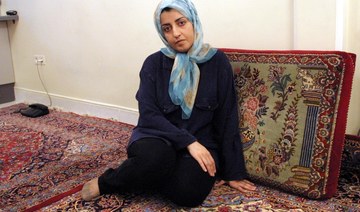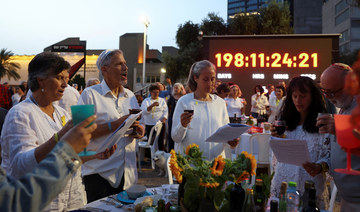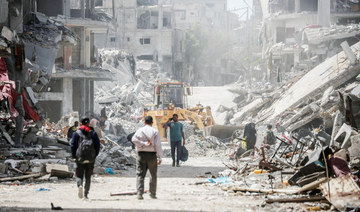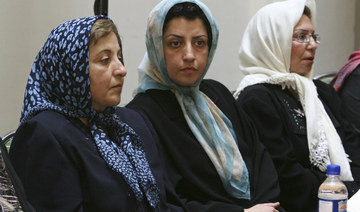DUBAI: Iranian Nobel Peace Prize laureate Shirin Ebadi said the death in custody of a young Iranian Kurdish woman last year has sparked an irreversible “revolutionary process” that would eventually lead to the collapse of the Islamic Republic.
Iran’s clerical rulers have faced widespread unrest since Mahsa Amini died in the custody of the morality police on Sept. 16 after she was arrested for wearing “inappropriate attire.”
Iran has blamed Amini’s death on preexisting medical problems and has accused the United States and other foes fomenting the unrest to destabilize the clerical establishment.
As they have done in the past in the face of protests in the past four decades, Iran’s hardline rulers have cracked down hard. Authorities have handed down dozens of death sentences to people involved in protests and have carried out at least four hangings, in what rights activists say is aimed at intimidating people and keep them off the streets.
A staunch critic of the clerical establishment that has ruled in Iran since the Islamic Revolution in 1979, Ebadi has been one of the most outspoken supporters of the anti-government demonstrations.
Like many critics of Iran’s clerical rulers, Ebadi believes the current wave of protests has been the boldest challenge to the establishment’s legitimacy yet.
“This revolutionary process is like a train that will not stop until it reaches its final destination,” said Ebadi, who won the Nobel Peace Prize in 2003 for her work defending human rights and who has been in exile in London since 2009.
The 1979 revolution toppled Iran’s Shah Mohammad Reza Pahlavi, a secular monarch allied with the West, and led to the formation of an Islamic Republic.
With the latest protests ushering Iran into an era of deepening crisis between the rulers and society at large, Amini’s death has unbottled years of anger among many Iranians over issues ranging from economic misery and discrimination against ethnic minorities to tightening social and political restrictions.
For months, Iranians from all walks of life have called for the fall of the clerical establishment, chanting slogans against Supreme Leader Ayatollah Ali Khamenei.
However, protests have slowed considerably since the hangings began. They have been at their most intense in the Sunni-populated areas of Iran and are currently mostly limited to those regions.
Videos shared on social media, unverifiable by Reuters, showed people chanting “Death to Khamenei” from rooftops in some cities, but nothing on the scale of past months.
The rights group HRANA said that as of Wednesday, 527 protesters had been killed during unrest, including 71 minors. It said 70 members of the security forces had also been killed. As many as 19,262 protesters are believed to have been arrested, it said.
GROWING ANGER
Ebadi, speaking in a phone interview from London, said the state’s use of deadly violence will deepen anger felt by ordinary Iranians about the clerical establishment because their grievances remain unaddressed.
“The protests have taken a different shape, but they have not ended,” Ebadi told Reuters in a phone interview from London.
With deepening economic misery, chiefly because of US sanctions over Tehran’s disputed nuclear work, many Iranians are feeling the pain of galloping inflation and rising joblessness.
Inflation has soared to over 50%, the highest level in decades. Youth unemployment remains high with over 50% of Iranians being pushed below the poverty line, according to reports by Iran’s Statistics Center.
The crackdown has stoked diplomatic tensions at a time when talks to revive Tehran’s 2015 nuclear deal with world powers are at a standstill. The United States and its Western allies have slapped sanctions on Iranian authorities and entities for their involvement in the crackdown and other human rights abuses.
To force Iran’s clerical establishment from power, Ebadi said the West should take “practical steps” such as downgrading its political ties with Iran by recalling its ambassadors from Tehran, and should avoid reaching any agreement with the Islamic Republic, including the nuclear deal.
Nobel laureate Ebadi says Iran’s ‘revolutionary process’ is irreversible
https://arab.news/mh3yj
Nobel laureate Ebadi says Iran’s ‘revolutionary process’ is irreversible

- Iran’s clerical rulers have faced widespread unrest since a 22-year-old woman died in custody last September
- Shirin Ebadi says the protest movement is ‘like a train that will not stop until it reaches its final destination’
Tent compound rises in Khan Younis as Israel prepares for Rafah offensive
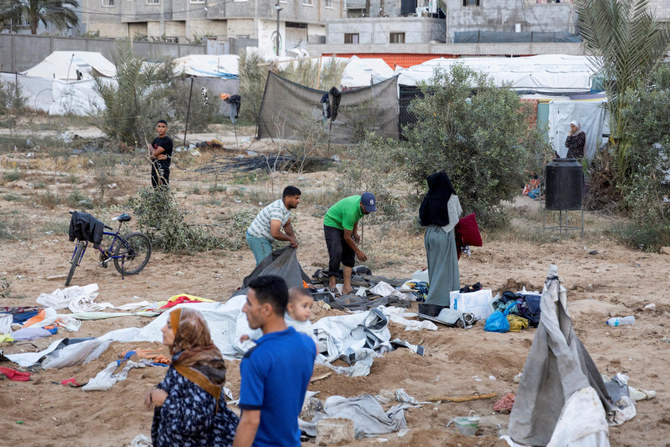
- Israel has said it plans to evacuate civilians from Rafah during an anticipated offensive on the southern city
- The Israel-Hamas war has killed more than 34,000 Palestinians
The tent construction is near Khan Younis, which has been targeted by repeated Israeli military operations over recent weeks. Israel has said it plans to evacuate civilians from Rafah during an anticipated offensive on the southern city, where hundreds of thousands of people have taken refuge during the war, now in its seventh month.
Also Monday, a failed rocket strike was launched at a base housing US-led coalition forces at Rumalyn, Syria, marking the first time since Feb. 4 that Iranian-backed militias have attacked a US facility in Iraq or Syria, a US defense official said. No personnel were injured in the attack, and no group has claimed responsibility for the attack.
The conflict has sparked regional unrest pitting Israel and the US against Iran and allied militant groups across the Middle East. Israel and Iran traded fire directly this month, raising fears of all-out war.
The war was sparked by the unprecedented Oct. 7 raid into southern Israel in which Hamas and other militants killed around 1,200 people, mostly civilians, and abducted around 250 hostages. Israel says militants are still holding around 100 hostages and the remains of more than 30 others.
The Israel-Hamas war has killed more than 34,000 Palestinians, according to local health officials, at least two-thirds of them children and women. It has devastated Gaza’s two largest cities and left a swath of destruction. Around 80 percent of the territory’s population have fled to other parts of the besieged coastal enclave.
The US House of Representatives approved a $26 billion aid package on Saturday that includes around $9 billion in humanitarian assistance for Gaza, which experts say is on the brink of famine, as well as billions for Israel. The US Senate could pass the package as soon as Tuesday, and President Joe Biden has promised to sign it immediately.
Iran’s foreign minister calls EU sanctions ‘regrettable’
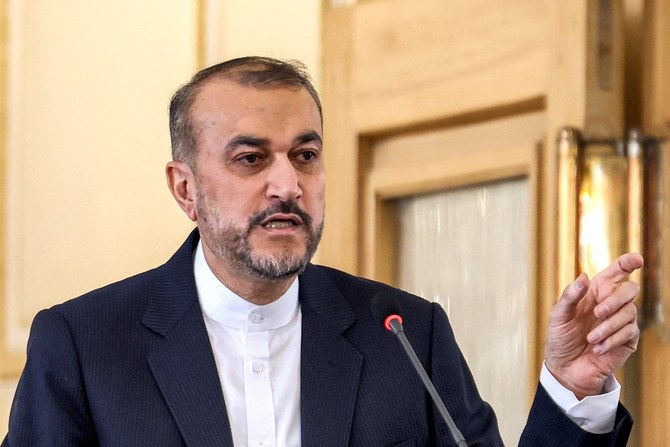
- EU foreign ministers agreed in principle to expand sanctions on Iran by agreeing to extend restrictive measures on Tehran’s weapons exports
DUBAI: European Union sanctions announced following Iran’s attack against Israel are “regrettable” because the country was acting in self-defense, Iran’s Foreign Minister Hossein Amirabdollahian posted on X on Tuesday.
Iran launched more than 300 drones and missiles on Israel in what it said was retaliation against a suspected Israeli bombing of its embassy compound in Damascus.
On Monday, EU foreign ministers agreed in principle to expand sanctions on Iran by agreeing to extend restrictive measures on Tehran’s weapons exports of any drone or missile to Iranian proxies and Russia.
“It is regrettable to see the EU deciding quickly to apply more unlawful restrictions against Iran just because Iran exercised its right to self-defense in the face of Israel’s reckless aggression,” Amirabdollahian said on X, before calling on the EU to apply sanctions on Israel instead.
More work will need to follow in Brussels to approve a legal framework before the expansion of the sanctions can take effect.
Israel’s Gaza war has negatively impacted human rights, says US report

- Rights issues include credible reports of unlawful killings, enforced disappearances and torture, says report
- Israeli military's conduct has come under scrutiny as its forces have killed over 34,000 in Gaza since Oct. 7
WASHINGTON: The war between Israel and Hamas that has killed tens of thousands of Palestinians in Gaza and resulted in a severe humanitarian crisis has had “a significant negative impact” on the human rights situation in the country, the US State Department said in its annual report on Monday.
Significant human rights issues include credible reports of arbitrary or unlawful killings, enforced disappearance, torture and unjustified arrests of journalists among others, said the State Department’s 2023 Country Reports on Human Rights Practices.
The report added that the Israeli government has taken some credible steps to identify and punish the officials who may have been involved in those abuses.
Israel’s military conduct has come under increasing scrutiny as its forces have killed 34,000 Palestinians in Gaza, according to the enclave’s health authorities, many of them civilians and children. The Israeli-occupied Gaza Strip has been reduced to a wasteland, and extreme food shortages have prompted fears of famine.
Israel launched its assault in response to a Hamas attack on Oct. 7, in which Israel says 1,200 people were killed.
Rights groups have flagged numerous incidents of civilian harm during the Israeli army’s offensive in Gaza, as well as raised alarm about rising violence in the Israeli-occupied West Bank, where Palestinian Health Ministry records show Israeli forces or settlers have killed at least 460 Palestinians since Oct. 7. But so far the Biden administration has said it has not found Israel in breach of international law.
Washington gives $3.8 billion in annual military assistance to its longtime ally. Leftist Democrats and Arab American groups have criticized the Biden administration’s steadfast support for Israel, which they say provides it with a sense of impunity.
But this month, President Joe Biden for the first time threatened to condition support for Israel, and insisted that it take concrete steps to protect humanitarian aid workers and civilians.
Israel’s Gaza war has negatively impacted human rights, says US report
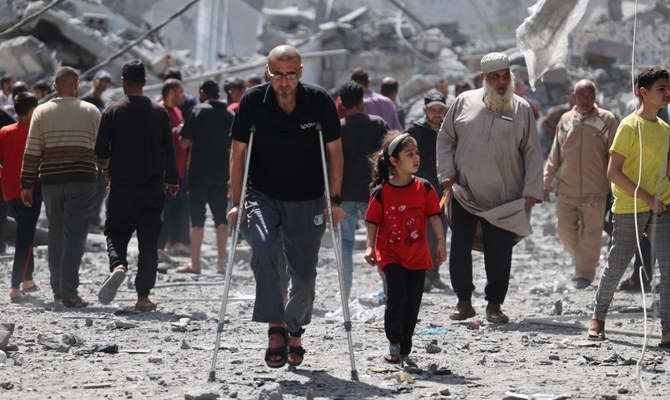
- The Israeli-occupied Gaza Strip has been reduced to a wasteland, and extreme food shortages have prompted fears of famine
WASHINGTON: The war between Israel and Hamas that has killed tens of thousands of Palestinians in Gaza and resulted in a severe humanitarian crisis has had “a significant negative impact” on the human rights situation in the country, the US State Department said in its annual report on Monday.
Significant human rights issues include credible reports of arbitrary or unlawful killings, enforced disappearance, torture and unjustified arrests of journalists among others, said the State Department’s 2023 Country Reports on Human Rights Practices.
The report added that the Israeli government has taken some credible steps to identify and punish the officials who may have been involved in those abuses.
Israel’s military conduct has come under increasing scrutiny as its forces have killed 34,000 Palestinians in Gaza, according to the enclave’s health authorities, many of them civilians and children. The Israeli-occupied Gaza Strip has been reduced to a wasteland, and extreme food shortages have prompted fears of famine.
Israel launched its assault in response to a Hamas attack on Oct. 7, in which Israel says 1,200 people were killed.
Rights groups have flagged numerous incidents of civilian harm during the Israeli army’s offensive in Gaza, as well as raised alarm about rising violence in the Israeli-occupied West Bank, where Palestinian Health Ministry records show Israeli forces or settlers have killed at least 460 Palestinians since Oct. 7. But so far the Biden administration has said it has not found Israel in breach of international law.
Washington gives $3.8 billion in annual military assistance to its longtime ally. Leftist Democrats and Arab American groups have criticized the Biden administration’s steadfast support for Israel, which they say provides it with a sense of impunity.
But this month, President Joe Biden for the first time threatened to condition support for Israel, and insisted that it take concrete steps to protect humanitarian aid workers and civilians.
Nobel laureate urges protest against Iran’s ‘war on women’
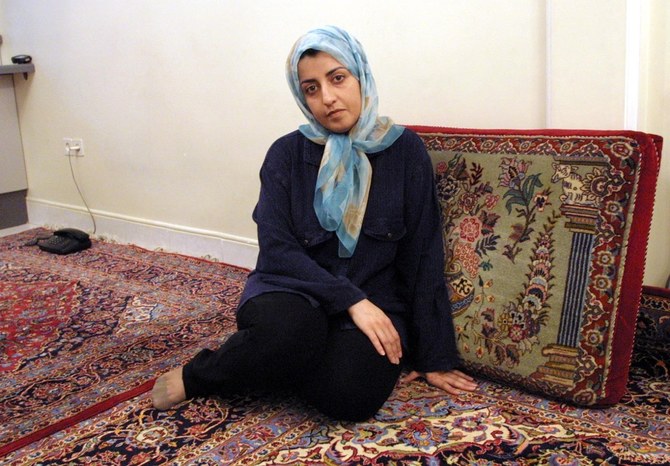
- Narges Mohammadi issues plea from Evin prison amid new crackdown by Tehran’s morality police
JEDDAH: Jailed Iranian Nobel laureate Narges Mohammadi urged Iranians on Monday to protest against the clerical regime’s “war against women” amid a new crackdown forcing women to cover their heads.
Mohammadi, who is being held in Evin prison in Tehran, called on Iranian women to share their stories of arrest and sexual assault at the hands of the authorities.
Iran launched a nationwide operation this month to enforce the wearing of the headscarf. Women have been arrested and taken to police stations by the morality police, and the Farsi hashtag meaning “war against women” has been trending on social media.
“People of Iran, I ask you, artists, intellectuals, workers, teachers, and students ... inside and outside the country to protest against this war against women,” Mohammadi said in a message from inside the prison. “Do not underestimate the power of sharing your experiences. Doing so will expose the misogynistic government and bring it to its knees.” She accused the authorities of bringing “a full-scale war against all women to every street in Iran.”
Mohammadi said she had been joined in jail by Dina Ghalibaf, a journalist and student who was arrested after accusing security forces on social media of putting her in handcuffs and sexually assaulting her during a previous arrest at a metro station. “For years, we have witnessed many women who have endured assault, abuse, and beatings by government agents,” Mohammadi said.
Mohammadi, 52, was awarded the Nobel Peace Prize last year in recognition of her campaign for human rights in Iran, which has led to her spending much of the past two decades in and out of jail. She has been imprisoned since November 2021 and has not seen her husband and twin children, who live in Paris, for several years.



